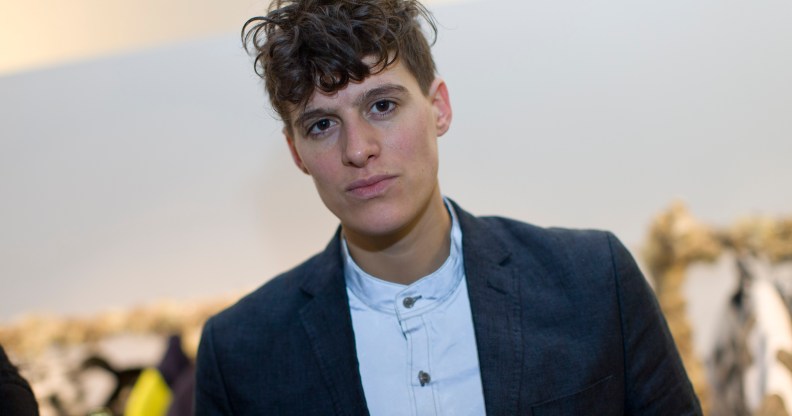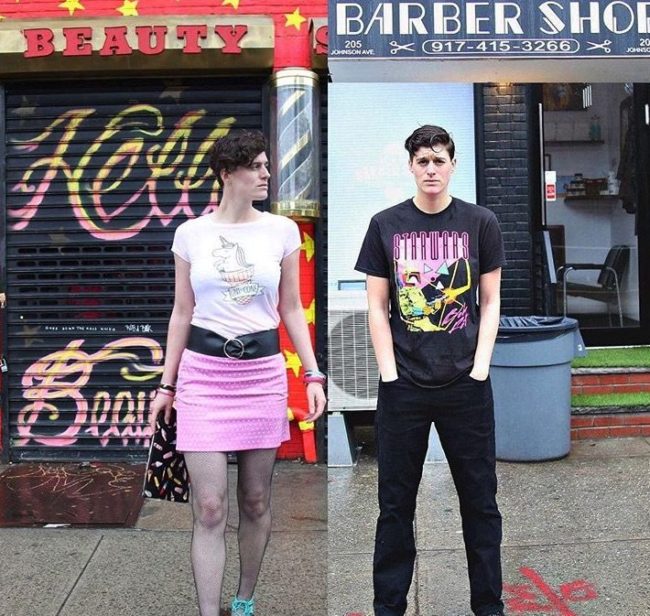What is gender capitalist? Presenting as both male and female to exploit the benefits of both sexes

Model Rain Dove poses for a portrait in the London Fashion Week venue in Soho in central London on February 23, 2016. (JUSTIN TALLIS/AFP/Getty)
A ‘gender capitalist’ is someone who recognises there are certain advantages and disadvantages to being a specific sex or gender and capitalises on that theory, according to some.
Despite the term having been written about in the past – often relating to women making money out of ventures based on their gender – model Rain Dove has recently pushed the term into a more prominent position.
Dove makes a living fronting ad campaigns and at runway shows, modelling clothes as both a man and a woman, assuming male and female identities.
“A gender capitalist is someone who takes advantage of opportunities given to people based on their perceived sex or gender,” Dove said in an interview with Bustle.
“When I’m a gender capitalist in the fashion world, I basically can go to any casting that I want to, as long as somebody likes my face.”
Related: Model Rain Dove: ‘Don’t judge people by their genitals’

(Instagram/Rain Dove)
“A good example is if I were alive during the time of the Titanic.
“As a male, I would get a job on the boat as men got paid higher and there weren’t really any women who got hired. But as soon as that ship was sinking, they said women and children first.”
The model also spoke about the idea of gender fluidity more generally.
“If I want to go to a club and save money because women are deemed sexual objects you’ll save money with no cover charge and people buying you drinks. You just have to be strong enough to put up your boundaries.
“But if I want to go home after that with a few drinks in my body, I would go home presenting myself what we deem to be male or masculine, as it’s safer. You don’t get bothered and are less likely to be mugged.
“I think the goal is to change this from a moment to a movement. As people, we didn’t choose our bodies.
“We didn’t choose our bodies. We’re getting punished for something we didn’t choose.”
Nobody called us up when the cells were dividing and said, ‘What skin colour do you want? What genitals? What size do you want to be?’ We came out as unique individuals and we’re getting punished for something we didn’t choose.”
Related: Piers Morgan claims gender-fluid people are ‘damaging to society’

(Instagram/Rain Dove)
Gender capitalism is seen by some as a way of closing the gender and opportunities gap between those identifying as men and those identifying as women.
They argue that business investment should be made through a “gender lens”.
This can increase women’s access to capital, promoting workplace equity, and create products and services that improve the lives of women and girls.
In 2014, academics Sarah Kaplan and Jackie VanderBrug wrote ‘The Rise of Gender Capitalism’ in the Stanford Social Innovation Review.
They focus on the theory from a more binary standpoint than Rain Dove – from the point of view of women, specifically – but it’s an interesting part of the gender capitalist conversation, and a feminist take on the issue.
“From these ideas, as well as from work in women’s philanthropy and advocacy for women’s corporate leadership, a movement focusing on the nexus of gender and investment is emerging,” they said.
“This movement, which encourages the use of capital to deliver financial returns and improve the lives of women and girls and their communities, is known as “’investing with a gender lens’.
“What do we mean by ‘lens’? A lens allows us to see the world differently.
Looking through a ‘gender lens’ helps investors gain new perspectives, highlight poorly understood inequalities, uncover new opportunities, identify, blockages in the system, and find value where none was found before.”
Related: Portugal passes law to let trans people self-identify their legal gender

(Getty)
Kaplan and VanderBrug discuss gender capitalism as part of the wider global capitalist structure:
“Investing with a gender lens is about creating a new economic logic that bridges the market logic of financial returns with the feminist logic of women’s equality.
“Traditional investors often fear that a focus on women may make them too pink, and traditional advocates for women’s rights often fear that engaging with investors may mean they are selling out.
“Gender lens investing builds a bridge between these two worlds. It is not about investing in women as if they were commodities, nor abandoning feminism (with its roots in anti-capitalism).
“Rather, the movement promotes gender analysis as a way of reshaping the system to change what we value as we invest.
“Paying attention to gender is not just about having a social conscience, nor is it about adding to our list of environmental, social, and governance investment screens.
“Instead, gender capitalism is about applying a gender lens to highlight the ways that gender is material to financial outcomes and financial outcomes are material to gender.”

